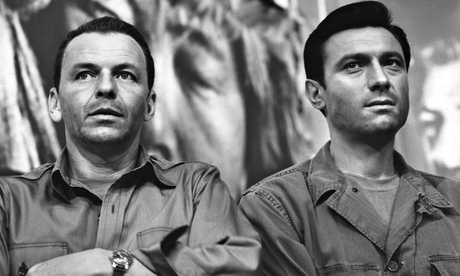Has history finally moved ahead of The Manchurian Candidate as it turns 60 years old?
John Frankenheimer’s thriller, about a cold-war conspiracy to assassinate a political leader using a sleeper agent, managed the neat, eerie trick of looking prescient for multiple decades following its 1962 release. The murky real-life assassination of John F Kennedy the following year, the quagmire of the United States’ anti-communism involvement in the Vietnam during the 10 years that followed, general 90s-era cultural paranoia and Dick Cheney’s machinations during the George W Bush presidency were among the touchstones that looked, from certain angles, like refracted images of the film. (Jonathan Demme seemed to sense this, remaking the movie halfway through the Bush years.)
The Manchurian Candidate didn’t exactly predict any of these events, but it certainly offered a more chilling vision of the near-and-far future than say, fellow spy thriller Dr No, which kicked off the James Bond series mere weeks earlier. (Some real-life parallels were even rumored to have been the reason Candidate was mostly out of circulation for some time between its initial release and a late-80s revival, though these claims have been debunked.)
It’s the balance between heightened, sweaty pulp and documentary-like touches that makes The Manchurian Candidate both exciting and weirdly applicable to a number of different political situations; it’s just strange enough to pass for a form of truth, just distorted enough to avoid fitting neatly into a single time and place. The plot is (probably?) preposterous: a group of captured Korean war soldiers are brainwashed into serving as sleeper agents for a consortium of communist forces, so that seeming military hero Raymond Shaw (Laurence Harvey) will assassinate a presidential candidate. Shaw is also the stepson of Senator John Iselin (James Gregory), a fearmongering, Joe McCarthy-like figure married to Shaw’s mother, Eleanor (Angela Lansbury), who keeps both Iselin and Shaw under her thumb.
Eleanor is the film’s most memorable villain, complicit with the assassination plot because it will elevate Iselin to even greater power. She claims that making Shaw the assassin was not her intention, which makes Shaw’s connection to the assassination some combination of strange coincidence and misguided attempt at convenience. After all, there are plenty of other candidates, including Bennett Marco (Frank Sinatra), another member of the platoon who unravels the conspiracy.
Frankenheimer films some of this material with stylized intensity, heavy on noirish canted angles and shadows. But the stark black-and-white cinematography and the use of closeups – he’s fond of compositions that get in close to a subject’s face, while additional action can be seen further away – also makes The Manchurian Candidate feel immediate, rather than a pure genre workout. That’s especially, ironically true when Frankenheimer deals with dreams and flashbacks that illuminate Shaw’s backstory; they’re just as vivid as the present-set material, and are woven into the narrative with disorienting ease. Much of the movie is from Marco’s point of view, but some of it is from Shaw’s, too, and rather than allowing this to diffuse the action, Frankenheimer makes that shared, uncertain perspective part of the movie’s psychology. Shaw has been made to feel isolated even though others do share his experiences.
Inhabiting a kind of alternate reality, of course, has become a major component of political discourse, and watching the movie now, it’s striking to see how some of its dynamics have been reversed in US politics. Now, an outlandish conspiracy involving sleeper agents joining forces with powerful elites seems more like paranoid fuel for QAnon wannabe freedom fighters; kinda takes the fun out of conspiracy investigations, doesn’t it? On top of that, the idea that a plot to overthrow the US government would need to hide behind respectability and subterfuge, rather than simply announce itself with Trumpian shamelessness, has started to feel curiously outdated. And aren’t today’s most prominent examples of political brainwashing primarily voluntary? Army platoons aren’t captured and made to watch hours of Fox News; would-be citizen soldiers surrender to this every day.
Then again, The Manchurian Candidate still has moments that ring with uncomfortable familiarity. Take the ill-fated Senator Thomas Jordan (John McGiver), the accused communist and object of Iselin’s scorn (and whose daughter Shaw loves). When Eleanor asks him if he would block her husband’s VP nomination, he responds in words that sound like they could have been spoken in 2016 or 2020: “There are people who think of Johnny as a clown and a buffoon, but I do not. I despise John Iselin, and everything that Iselin-ism has come to stand for. I think if John Iselin were a paid Soviet agent, he could not do more to harm this country than he’s doing now.”
That sentiment points to what keeps The Manchurian Candidate fresh six decades on, even as the real-world particulars shift. Iselin and especially Eleanor are after power, seemingly for the sake of it; they don’t espouse ideals in line with the communist forces that have allowed this attempt at a takeover, and in that way do sound a bit like Bond villains. For that matter, even most Bond villains have some kind of monologue-worthy goal, however mad; Eleanor’s big statement of purpose is to enthuse about the post-assassination hysteria that will “sweep [them] up into the White House with powers that will make martial law seem like anarchy.”
The Manchurian Candidate still works as a conspiracy story because the craziness of the conspiracy barely seems to register for its on-screen villains – or even its hero Marco, who ends the movie with more despair than vindication. True believers, whether colluding communists or soldiers who believe in their cause, are still just game pieces for the power-hungry.








